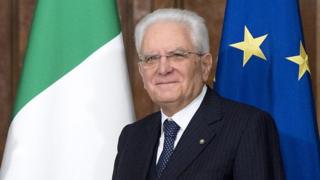Italy dissolves parliament for March election
Italy's President Sergio Mattarella has dissolved parliament, to pave the way for a general election on 4 March.
The government met shortly after Mr Mattarella's decree was announced, and confirmed the election date.
The ruling centre-left Democratic Party (PD) faces a strong challenge from anti-establishment Five Star (M5S) and right-wing Forza Italia, who want tough measures to curb immigration.
The influx of migrants – mostly from sub-Saharan Africa – is a major issue.
Paolo Gentiloni is the third prime minister to have served in the outgoing legislature, elected in 2013.
Opinion polls suggest the main rivals – PD, M5S and Forza Italia – will split the vote, making an overall majority for any party unlikely.
According to the polls, M5S has the most voter support – about 28%, ahead of PD on about 23% and Forza Italia, on about 16%, Reuters news agency reports.
Berlusconi bounces back
Former prime minister Silvio Berlusconi, despite a 2013 conviction for tax fraud, appears to be gaining ground as leader of Forza Italia, and the party is expected to form an election alliance with other right-wing parties.
Mr Gentiloni told a news conference on Thursday that Italy "has started moving again, we will continue to govern".
He said the PD would stay in office up until the election, and warned against "any sharp or painful interruptions at a very delicate time for the Italian economy".
Italy's growth was picking up again, he said, with "a million jobs restored, most of them long-term ones".
Migrant crisis
Mr Gentiloni also lamented his government's failure to pass a law – called "ius soli" (birthright citizenship) – that would make citizens of many of the 800,000 children born in Italy to foreign parents.
He stressed that it would not apply to the many Africans who have arrived by boat from North Africa in recent years. Citizenship could be granted to the children of parents with long-term residency, or those under 12 who complete at least five years of formal education.
"The truth is we didn't manage to put together sufficient numbers [in parliament] to approve the law," he said. The problem was not the law's contents, he said.
Not enough senators attended the final session of the upper house – the Senate – to vote on the draft law.
Opinion polls suggest that many Italians oppose the draft law on citizenship.
This year Italy experienced the EU's biggest influx of migrants crossing the Mediterranean, most of them sent by people-smuggling gangs in Libya, packed aboard rickety boats.
Data from the UN refugee agency (UNHCR) shows that 119,247 arrived in Italy by boat, while Greece – previously the EU's main immigration hotspot – took in 29,085. More than 3,000 drowned at sea.
A note on terminology: The BBC uses the term migrant to refer to all people on the move who have yet to complete the legal process of claiming asylum. This group includes people fleeing war-torn countries such as Syria, who are likely to be granted refugee status, as well as people who are seeking jobs and better lives, who governments are likely to rule are economic migrants.

